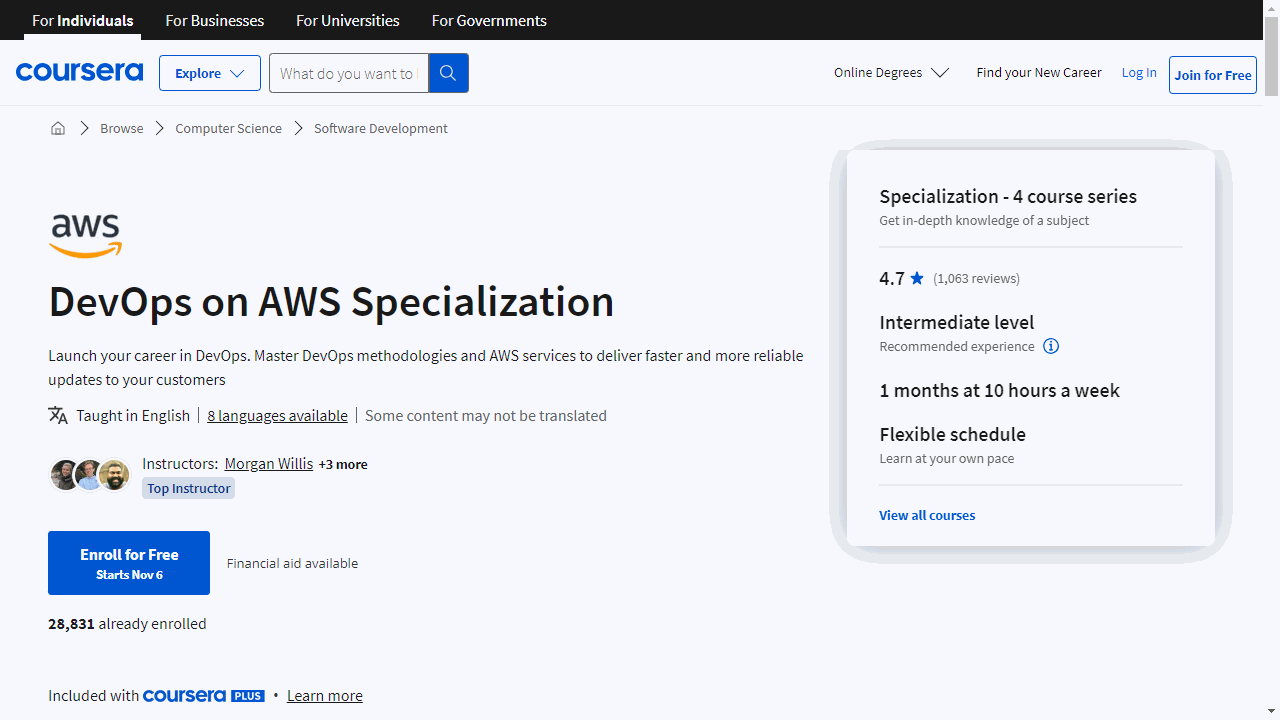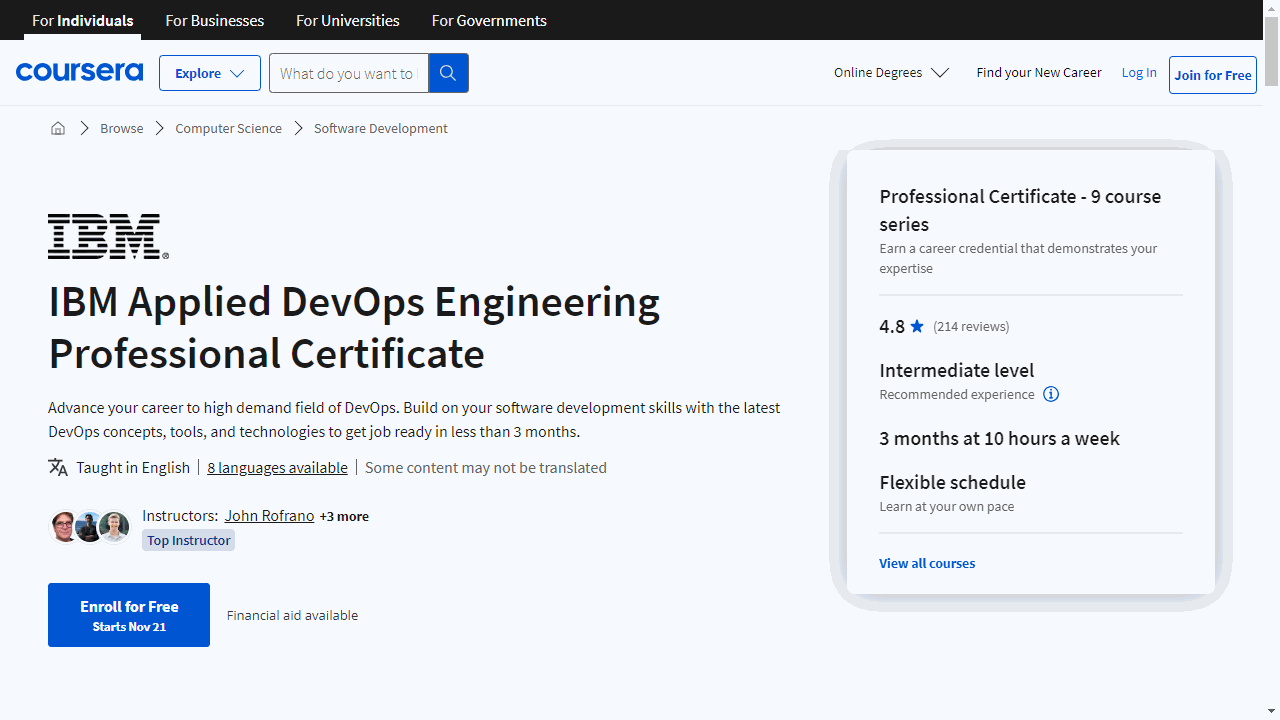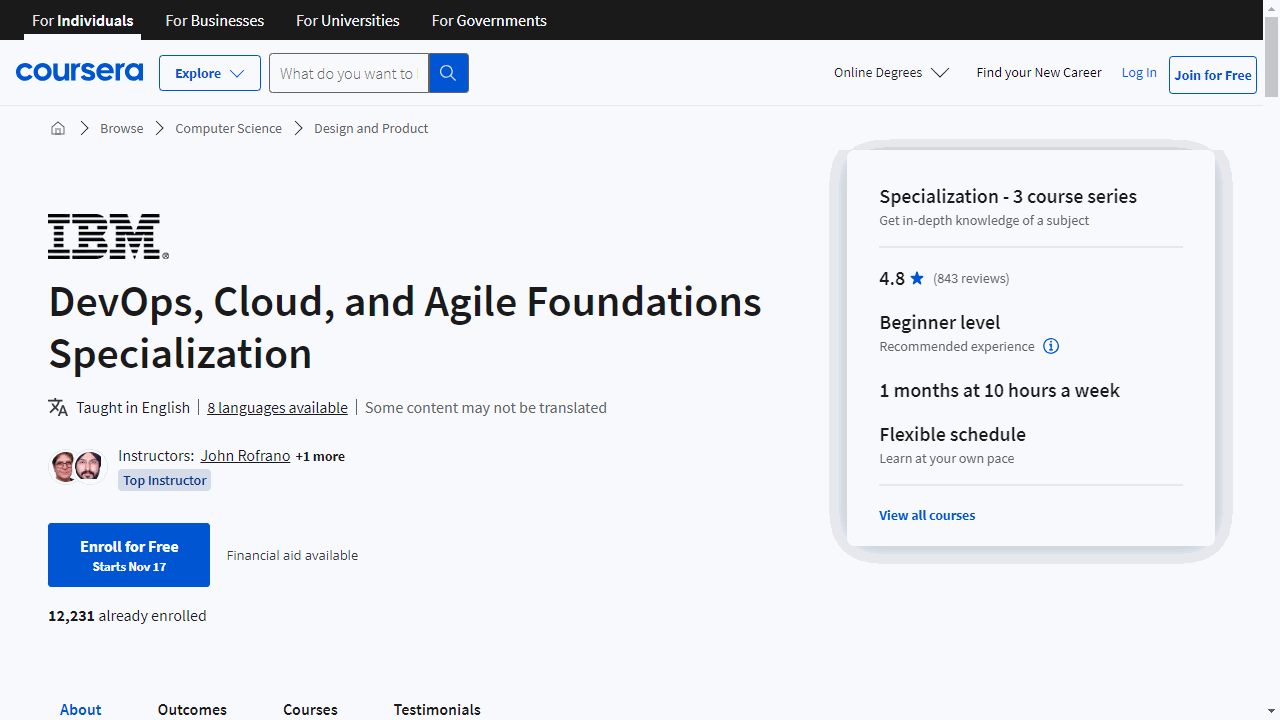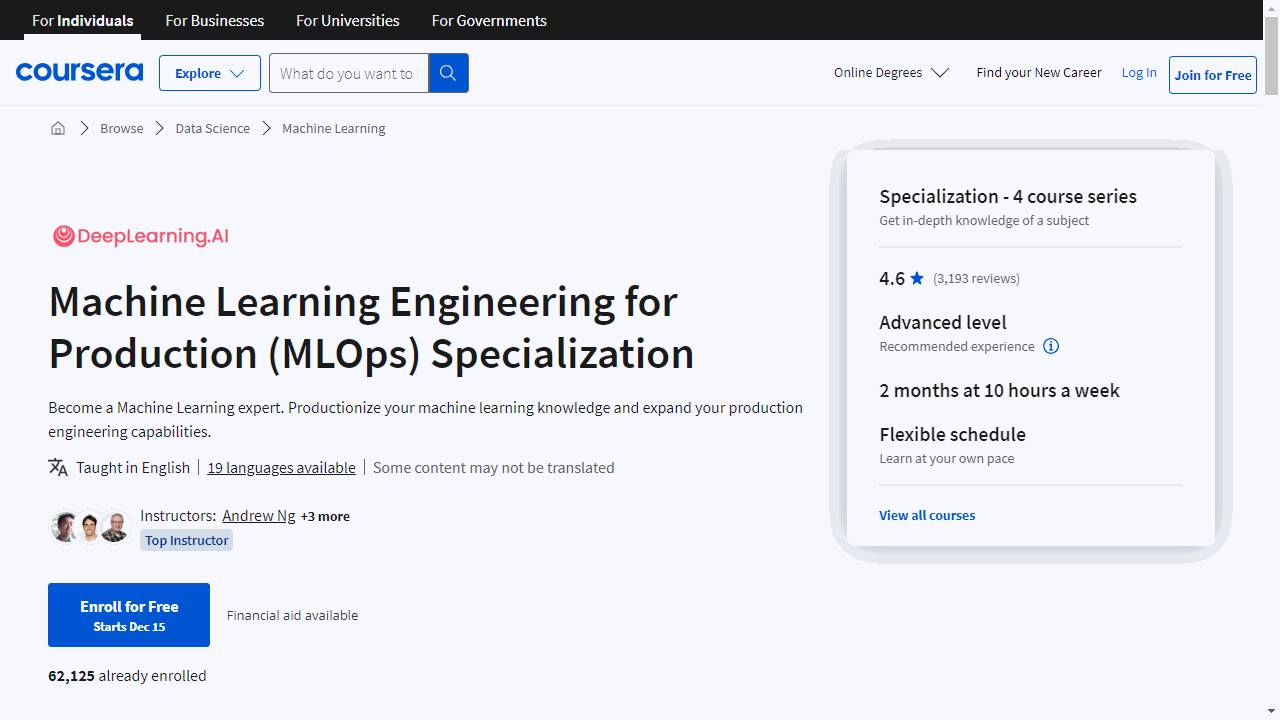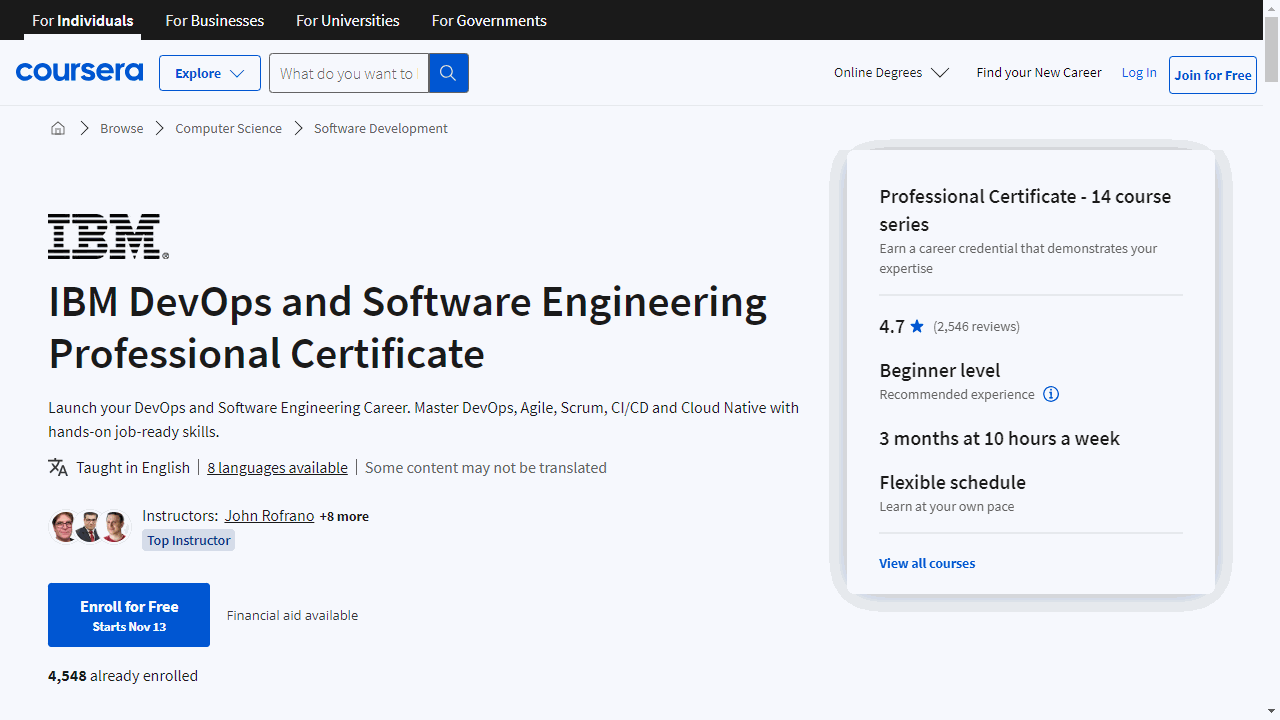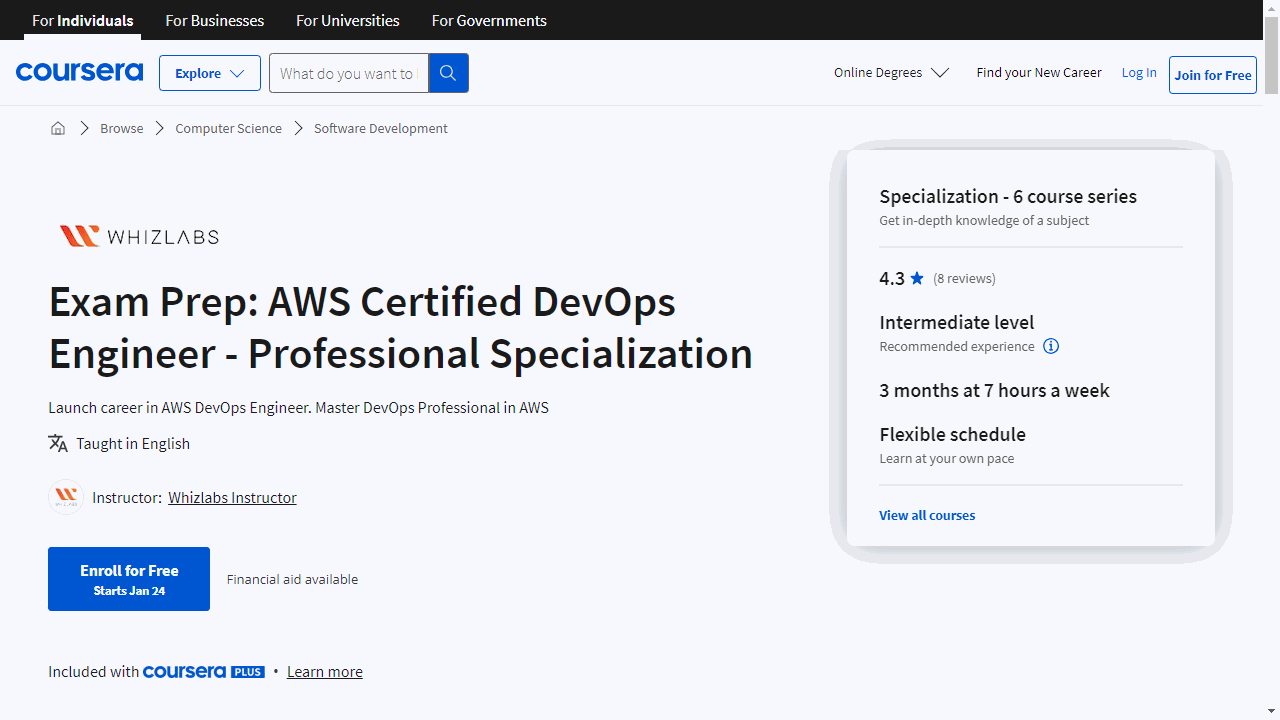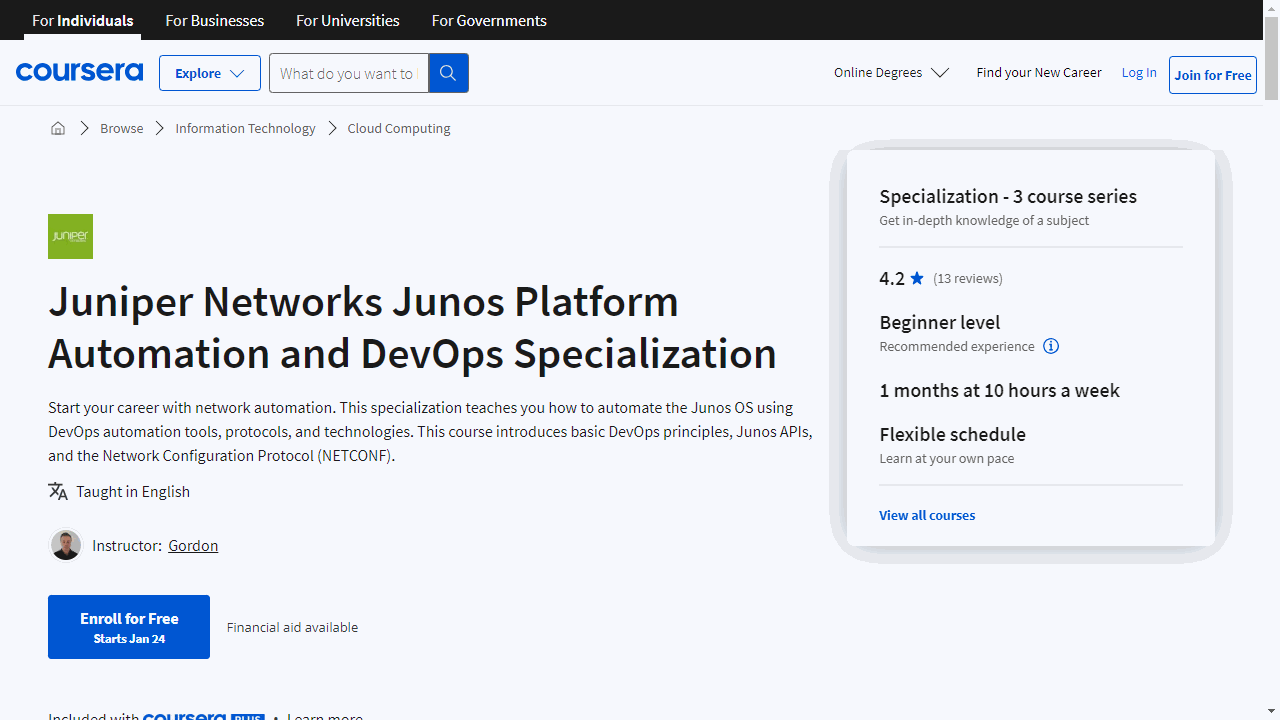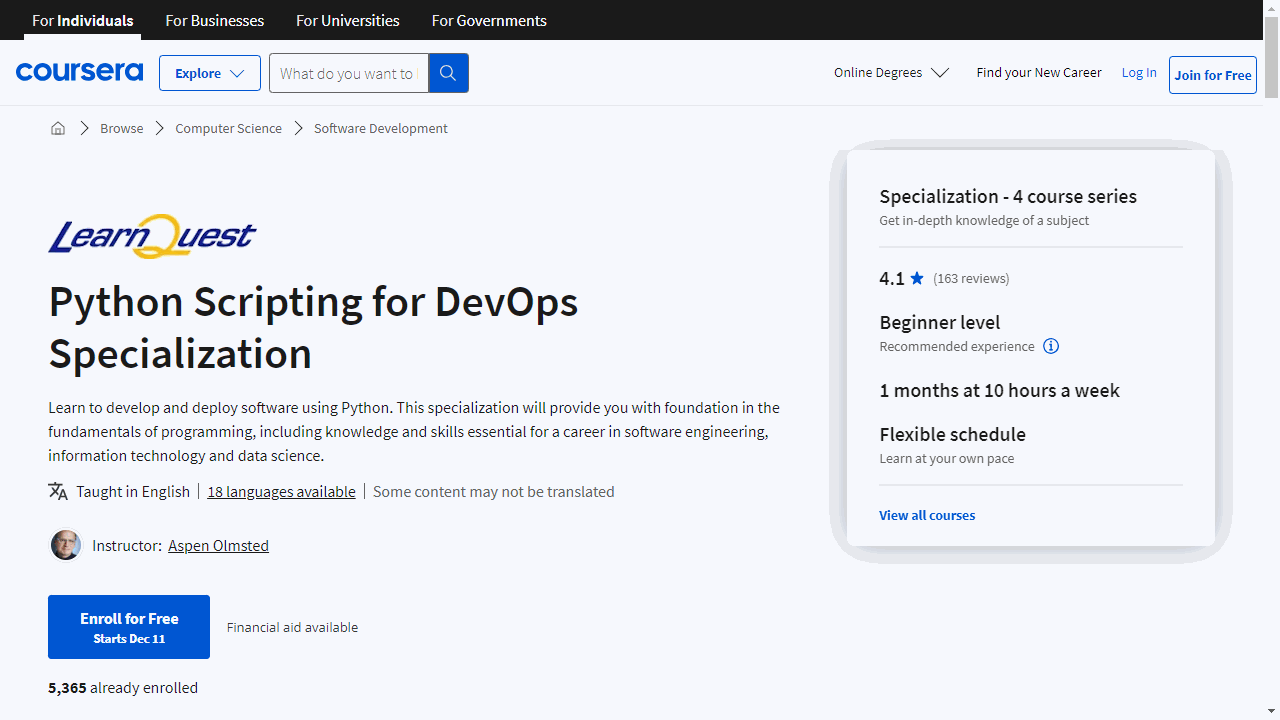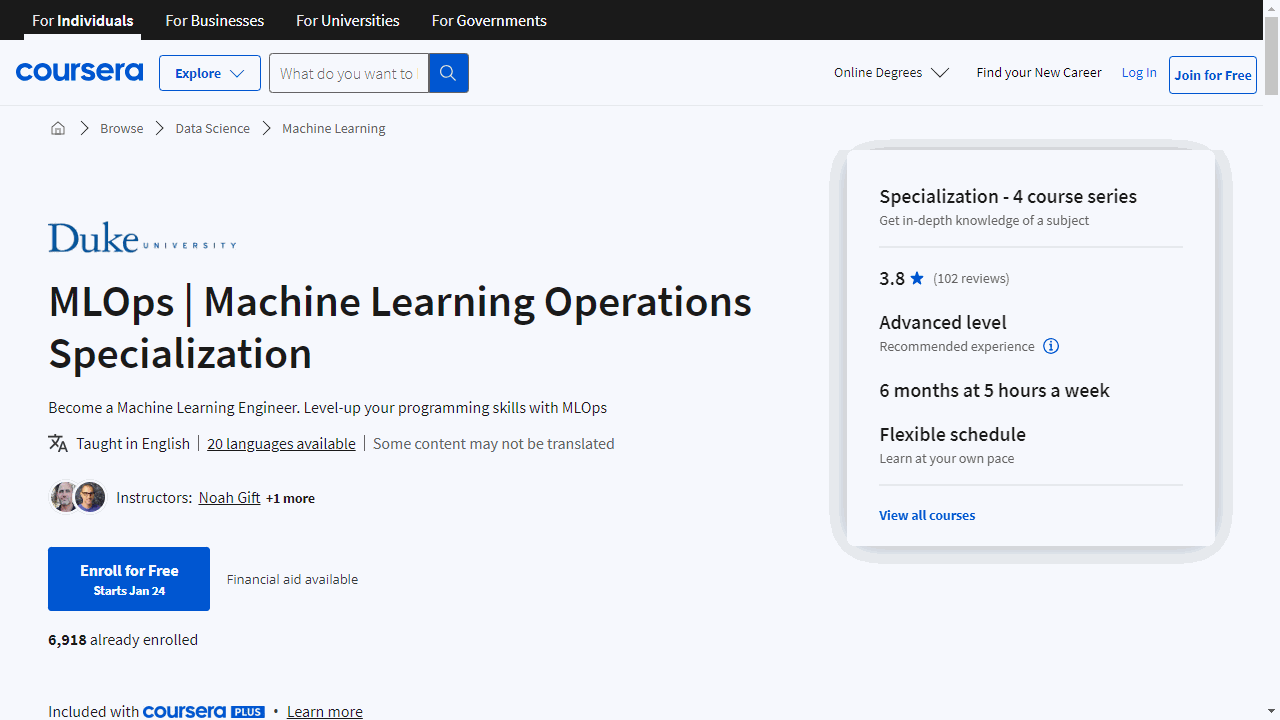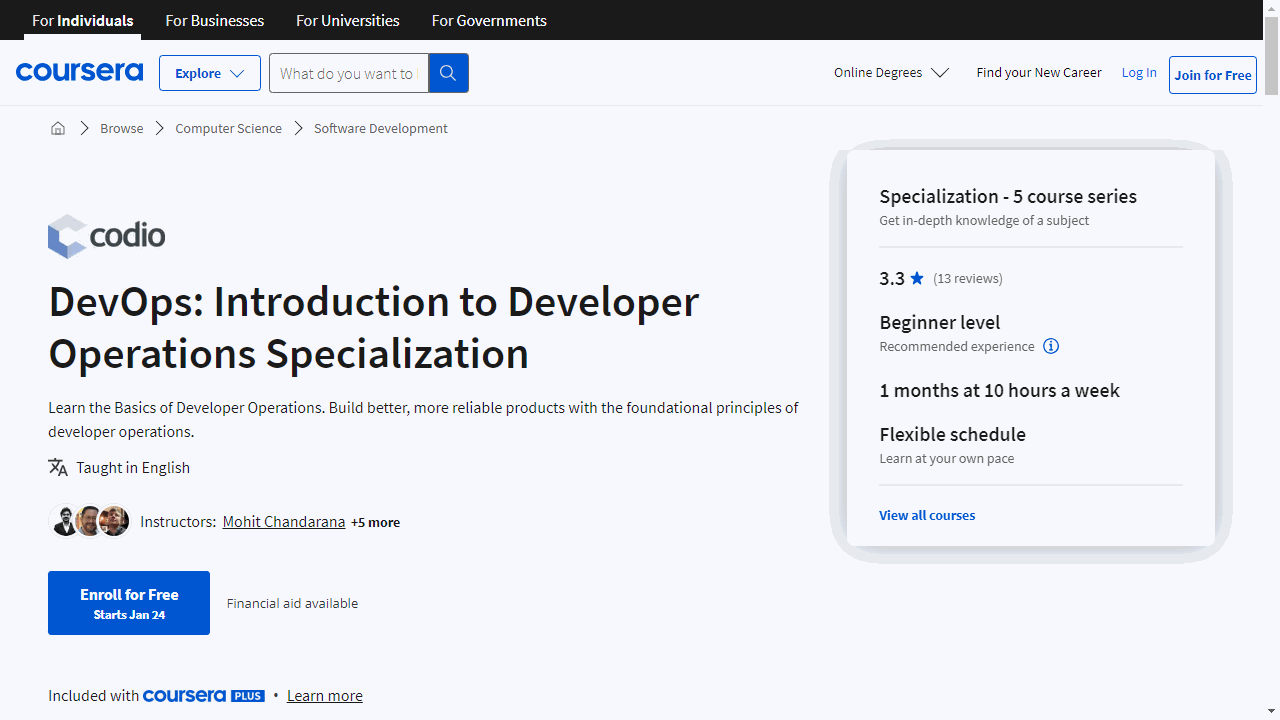You’re ready to level up your career and the demand for skilled DevOps professionals is skyrocketing.
But where to start?
Finding the right training can feel overwhelming with so many options available.
If you’re specifically eyeing Coursera and wondering “What are the best DevOps courses on Coursera?” you’ve come to the right place.
This carefully curated list dives into the top-rated Coursera specializations and certificates designed to equip you with in-demand DevOps skills.
Whether you’re brand new to the world of automation and CI/CD or looking to dive deeper into cloud platforms like AWS, these courses offer a flexible and affordable path to mastery.
But if you’re looking for the best overall DevOps course on Coursera, we recommend checking out the “DevOps on AWS Specialization.”
This hands-on program focuses on the most in-demand AWS tools and real-world examples to give you practical experience for building and deploying cloud applications.
Let’s explore the top DevOps courses Coursera has to offer and launch your journey towards becoming a highly sought-after DevOps pro.
DevOps on AWS Specialization
This 4-course series gives you hands-on practice with the most in-demand AWS services for building, deploying, and monitoring cloud-based applications.
Start with “AWS Cloud Technical Essentials” to get a strong foundation in core AWS offerings like EC2, S3, and IAM. You’ll gain the cloud computing know-how to make informed decisions for different use cases. Technical backgrounds preferred, but not required.
Then level up your DevOps skills in “Code, Build, and Test”. Master CI/CD pipelines, test automation, and code quality tools for faster delivery. Apply leading practices like infrastructure as code to boost reliability.
In “Release and Deploy” you’ll streamline provisioning and reduce errors using AWS services purpose-built for DevOps. Explore deploying updates with CodeDeploy and Lambda. See how a CloudFormation template centralizes backend services.
Finally, monitor and operate your architecture with CloudWatch, EventBridge, and more. Discover issues before they become outages. Continuously comply through automation. Optimize performance with ML-powered insights.
With real-world examples and hands-on exercises using AWS’ innovative offerings, this Specialization will give you the practical DevOps skills to deliver higher-quality applications faster.
IBM Applied DevOps Engineering Professional Certificate
The journey begins with “Introduction to DevOps,” a course tailored for those new to the field or looking to expand their knowledge.
It covers the cultural aspects of DevOps, emphasizing collaboration and a shared sense of responsibility.
You’ll also delve into cloud-native architecture and learn about CI/CD, which are critical for creating resilient applications.
Moving on to “Introduction to Agile Development and Scrum,” you’ll immerse yourself in Agile practices and the Scrum framework.
The course is interactive, with practical labs that use real-world tools like GitHub and ZenHub.
You’ll learn to craft user stories, manage sprints, and use kanban boards, all within the context of a collaborative team environment.
In “Introduction to Containers w/ Docker, Kubernetes & OpenShift,” you’ll gain skills in containerization—a must-have in today’s software development landscape.
The course offers hands-on labs where you’ll work with Docker and Kubernetes, and by the end, you’ll be equipped to deploy and manage containers in the cloud using OpenShift.
The “Application Development using Microservices and Serverless” course introduces you to the modern approach of building applications.
You’ll create microservices and explore serverless computing, culminating in a project where you deploy an application to the cloud, giving you practical experience with the technologies.
For those interested in quality assurance, “Introduction to Test and Behavior Driven Development” focuses on automated testing techniques like TDD and BDD.
You’ll learn how to write tests that ensure your code functions correctly, an essential skill for any developer aiming to produce reliable software.
The “Continuous Integration and Continuous Delivery (CI/CD)” course teaches you how to automate software development processes to improve efficiency and reduce errors.
You’ll get to know CI/CD tools and create pipelines that streamline the path from code changes to production deployment.
Security is a critical concern, and “Application Security for Developers and DevOps Professionals” addresses this by teaching you how to identify vulnerabilities and secure your applications.
You’ll explore security practices and tools that help maintain a secure development environment.
“Monitoring and Observability for Development and DevOps” ensures you can keep your applications performing optimally.
You’ll learn about monitoring tools and observability principles, gaining the skills to troubleshoot and optimize software performance.
The capstone of the certificate is the “DevOps Capstone Project,” where you’ll apply everything you’ve learned.
You’ll take a project from conception to deployment, demonstrating your ability to develop, test, and maintain a cloud-based application.
You’ll learn from IBM’s industry experts and gain hands-on experience with the tools and practices used by professionals today.
IBM DevOps, Cloud, and Agile Foundations Specialization
The specialization kicks off with “Introduction to DevOps,” a course that lays the groundwork for understanding the DevOps culture.
It’s not just about the technical skills—though you’ll get plenty of those—it’s also about fostering collaboration and shared responsibility.
You’ll explore how to use cloud native architecture to enhance product resilience and delve into essential DevOps tools and practices, such as CI/CD, which streamline the development process.
Moving on to “Introduction to Cloud Computing,” this course demystifies the cloud, providing a clear explanation of its service models and deployment strategies.
You’ll gain insight into the offerings of major cloud providers and learn about the architecture that underpins cloud services.
The course culminates in a hands-on project where you’ll apply what you’ve learned by deploying an application using serverless architecture, giving you a tangible skill to showcase.
Lastly, “Introduction to Agile Development and Scrum” introduces you to the world of Agile methodologies, focusing on how to adapt to change and deliver value quickly.
You’ll understand the roles within a Scrum team and the importance of iterative planning.
By learning to write effective user stories and manage a product backlog, you’ll be equipped to enhance team efficiency and meet customer needs more effectively.
The content is presented in a straightforward manner, with a focus on real-world application, ensuring that you’re not just learning theories but also how to apply them in practice.
Machine Learning Engineering for Production (MLOps) Specialization
Provider: DeepLearning.AI
This hands-on program equips you with the skills to build, manage, and deploy AI applications effectively.
Start with “Introduction to Machine Learning in Production,” where you’ll learn to navigate the ML lifecycle, scope projects, and set model baselines.
You’ll tackle concept drift and design ML systems from the ground up, preparing you to handle real-world deployment challenges.
Move on to “Machine Learning Data Lifecycle in Production,” where building robust data pipelines is key.
You’ll master data cleaning, validation, and feature engineering with TensorFlow Extended.
This course ensures you understand how to maintain high data quality throughout your AI system’s lifecycle.
In “Machine Learning Modeling Pipelines in Production,” you’ll create models for various serving environments and manage resources for efficient inference.
Dive into model fairness and explainability, ensuring your AI solutions are responsible and understandable.
Finally, “Deploying Machine Learning Models in Production” teaches you to launch models for user interaction.
You’ll construct scalable infrastructures, automate workflows, and monitor systems to ensure reliability and compliance with standards like GDPR.
By completing this specialization, you’ll gain expertise in MLOps, TensorFlow, data transformation, and model monitoring.
IBM DevOps and Software Engineering Professional Certificate
Provider: IBM
This program is tailored to provide a well-rounded education, from the fundamentals of DevOps to the intricacies of cloud computing and beyond.
The “Introduction to DevOps” course is where you’ll start, gaining insight into the collaborative culture that drives high-performing teams.
You’ll explore essential practices like CI/CD and get a taste of cloud native architecture, setting a strong foundation for building robust applications.
Cloud computing is no longer just a buzzword, and the “Introduction to Cloud Computing” course ensures you understand why.
It covers everything from service models to the architecture of the cloud, preparing you to deploy applications with confidence.
The hands-on project at the end is a practical way to apply what you’ve learned.
Agile and Scrum methodologies are at the heart of modern software development, and “Introduction to Agile Development and Scrum” will help you master these approaches.
You’ll learn to plan sprints, manage backlogs, and improve team efficiency, all while fostering a collaborative environment.
If you enjoy the technical side, “Hands-on Introduction to Linux Commands and Shell Scripting” offers a deep dive into the Linux operating system.
You’ll learn to navigate the terminal and write scripts that automate tasks, skills that are invaluable in today’s tech landscape.
Version control is essential, and “Getting Started with Git and GitHub” demystifies this process.
You’ll learn how to manage code changes and collaborate effectively using GitHub, a skill that’s critical for any software engineering role.
Python is a versatile language, and “Python for Data Science, AI & Development” introduces you to its potential. Whether you’re interested in data analysis, AI, or general development, this course provides the tools to start coding with Python.
The “Developing AI Applications with Python and Flask” course allows you to apply your Python skills to the exciting world of AI.
You’ll build web applications using Flask and integrate AI features, preparing you for the future of software development.
Containerization is changing the deployment landscape, and “Introduction to Containers w/ Docker, Kubernetes & OpenShift” ensures you’re up to speed.
You’ll learn how to use these tools to create flexible, scalable applications—a skill that’s increasingly important in the industry.
Microservices and serverless architectures are modern approaches to building applications, and “Application Development using Microservices and Serverless” guides you through these concepts.
You’ll learn to develop and deploy applications in a way that’s both efficient and scalable.
Testing is crucial, and “Introduction to Test and Behavior Driven Development” focuses on ensuring your code works as intended.
You’ll practice writing tests that keep your development process on track and your end product reliable.
Automation is a key component of DevOps, and “Continuous Integration and Continuous Delivery (CI/CD)” teaches you how to streamline the software delivery process.
You’ll explore tools and practices that make releasing software faster and more reliable.
Security is non-negotiable, and “Application Security for Developers and DevOps Professionals” equips you with the knowledge to safeguard your applications.
You’ll delve into security best practices and learn how to integrate security measures throughout the development lifecycle.
Lastly, “Monitoring and Observability for Development and DevOps” teaches you how to keep your applications running smoothly.
You’ll get hands-on with monitoring tools and learn the principles of observability, ensuring you can maintain and improve your systems effectively.
The capstone project is where everything comes together.
You’ll apply all the skills you’ve acquired to develop and deploy a real-world application, demonstrating your readiness for a career in DevOps and software engineering.
This certificate program is comprehensive, offering a blend of theoretical knowledge and practical experience.
It’s designed to prepare you for a variety of roles in the tech industry, making it a smart investment for your future.
Exam Prep: AWS Certified DevOps Engineer - Professional Specialization
Kick off with “Getting Started with AWS DevOps,” where you’ll grasp AWS basics across Compute, Management & Governance, and Serverless services.
With 3 hours of video lectures, you’ll delve into high availability and configuration management.
If you have two years of AWS experience, this course will sharpen your serverless application skills and prep you for the exam.
Move on to “AWS: CI/CD Pipelines and Deployment Strategies,” which immerses you in the SDLC and CI/CD pipeline creation using Amazon ECS.
This course is ideal if you have a year’s experience in CI/CD pipelines, teaching you to manage and test these systems effectively.
In “AWS: Configuration Management and Infrastructure as Code,” you’ll focus on automating AWS infrastructure.
It’s perfect if you’re versed in ‘Infrastructure as Code’ and have a year of automation experience, as it deepens your knowledge of AWS OpsWorks and CloudFormation.
The “AWS: Containerization” course is a deep dive into deploying container-based applications and managing Kubernetes within AWS.
If you’re looking to modernize Java and .NET applications into containers, this course’s 3 hours of content are invaluable.
For monitoring and governance, “AWS: Monitoring, Logging, and Governance” equips you with the skills to oversee AWS resources, implement governance controls, and deploy serverless architectures.
With a year of monitoring experience, you’ll learn to debug and trace applications with precision.
Lastly, “AWS: Resilient Solutions and Security Controls” teaches you to build scalable, secure AWS solutions.
You’ll explore disaster recovery and network security, crucial if you have two years of experience and are focused on optimizing costs and implementing robust security controls.
Throughout these courses, you’ll engage with key entities such as EC2, Kubernetes, CI/CD, and CloudWatch, tackling real-world scenarios through interactive video lectures and quizzes.
By the end, you’ll not only be prepared for the AWS Certified DevOps Engineer - Professional exam but also possess a comprehensive understanding of AWS DevOps practices.
Juniper Networks Junos Platform Automation and DevOps Specialization
Provider: Juniper Networks
This series of courses equips you with practical skills for automating Juniper Networks devices using the Junos OS.
Start with “Juniper Networks Junos Automation Basics and XML” to understand the core of Junos OS.
You’ll learn how automation can enhance network reliability and how XML plays a crucial role in device configuration.
This course is beginner-friendly, offering an introductory module to get you acquainted with Junos OS.
Move on to “Juniper Networks Automation Using Python and PyEZ,” where you’ll embrace Python, a versatile programming language ideal for network automation.
Through hands-on practice, you’ll modify Python scripts and harness the power of Junos PyEZ, a Python library, to automate Junos OS device management.
Key concepts like JSON and YAML are also covered, ensuring you can handle various data formats with ease.
Finally, “Juniper Networks Automation Using Ansible and the REST API” introduces you to Ansible, a leading DevOps tool, and the REST API for seamless communication with Junos devices.
You’ll learn to perform tasks such as verifying Ansible installations, retrieving device information, and configuring devices using Ansible.
By completing this specialization, you’ll gain competencies in network reliability engineering, Python scripting, and API usage for automation.
Python Scripting for DevOps Specialization
Provider: LearnQuest
If you’re looking to make computers work for you and streamline your workflow, this specialization is your answer.
This series of courses is a practical journey into Python scripting, a must-have skill for DevOps and automation.
Kick off with “Introduction to Python Scripting for DevOps,” where you’ll grasp the essentials of procedural programming.
You’ll learn to handle user input, produce console output, manage variables, and control your program’s flow with decisions and loops.
The labs provide a hands-on experience, reinforcing your learning by solving practical problems.
Move on to “Python Scripting: Dates, Classes and Collections,” where you’ll tackle advanced string operations and date handling.
This course empowers you to model and develop classes and manage data with collections, equipping you to create sophisticated programs for business and mathematical applications.
The third course, “Python Scripting: Files, Inheritance, and Databases,” introduces you to file management, a cornerstone of data handling.
You’ll delve into inheritance to streamline your code and use external libraries like Numpy for advanced computational tasks.
Conclude your learning with “DevOps and Build Automation with Python,” where you’ll apply Python to automate DevOps processes.
This course covers unit testing, integration testing, and manual testing, ensuring your code is robust and reliable.
By the end of this specialization, you’ll have a robust foundation in Python, ready to tackle real-world automation challenges.
Get set to code, solve, and automate with confidence!
MLOps | Machine Learning Operations Specialization
Provider: Duke University
This is a comprehensive program that equips you with the skills to blend machine learning with operational know-how.
Kick off with “Python Essentials for MLOps” to master Python, the programming language at the heart of many MLOps tasks.
You’ll tackle data with Pandas and NumPy, and automate operations with Python scripts.
Practical exercises will have you writing and debugging code like a pro.
In “DevOps, DataOps, MLOps,” you’ll explore how these methodologies apply to real-world AI challenges.
You’ll gain experience with web frameworks and command-line tools, and even delve into Rust for tasks requiring extra speed.
By the course’s end, you’ll confidently build and deploy ML models—a skill set that’s increasingly sought after.
For cloud enthusiasts, “MLOps Platforms: Amazon SageMaker and Azure ML” is a treasure trove.
It’s hands-on with AWS and Azure, guiding you through deploying machine learning solutions in production settings.
This course is also a stepping stone if you’re aiming for AWS or Azure machine learning certifications.
Finally, “MLOps Tools: MLflow and Hugging Face” introduces you to essential open-source platforms.
You’ll manage and deploy models, create APIs, and master cloud deployment.
This course is ideal if you’re eager to enhance your programming skills within the MLOps framework.
Throughout these courses, you’ll dive into Python programming, cloud computing, GitHub, Docker, and more.
You’ll learn about data management, continuous integration, and deploying machine learning models.
Real-world tools and projects ensure you’re job-ready.
So, if you’re looking to merge DevOps with machine learning, this specialization is tailored for you.
It’s practical, detailed, and taught by experts, setting you up for success in the evolving field of MLOps.
DevOps: Introduction to Developer Operations Specialization
From GitHub to Kubernetes, and from cloud computing to automation, these courses cover the essentials you need to excel in DevOps.
Dive into “Mastering Ansible Automation” to quickly grasp automation using Ansible.
You’ll tackle real-world tasks involving files, packages, and users, and decode the structure of YAML files.
The course’s interactive format, free from video lectures, allows you to learn by doing, with immediate feedback on your progress.
If you’re ready to automate your coding workflow, “CI/CD for Software Developers” is your next step.
You’ll master GitHub Actions to automate building, testing, and quality control of your code, culminating in deployment skills.
A GitHub account is required, but the course guides you through the setup.
For a zero-experience entry into container technology, “Container Creation and Orchestration Basics” is ideal.
You’ll get hands-on with container creation and Kubernetes orchestration on an Ubuntu system, learning to deploy containers effectively.
“Introduction to Terraform” offers a beginner-friendly journey into cloud infrastructure management.
Without any installations, you’ll use Terraform to manage cloud resources, learning to build and modify infrastructure with this powerful IaaS tool.
Lastly, “Performance Monitoring For Application Developers” focuses on optimizing your applications’ performance.
Through hands-on exercises, you’ll learn to monitor with Prometheus and create insightful visualizations with Grafana, all within your browser.
Each course in this specialization is designed for active learning, with exercises that provide instant feedback, ensuring you build a deep understanding of DevOps practices.
